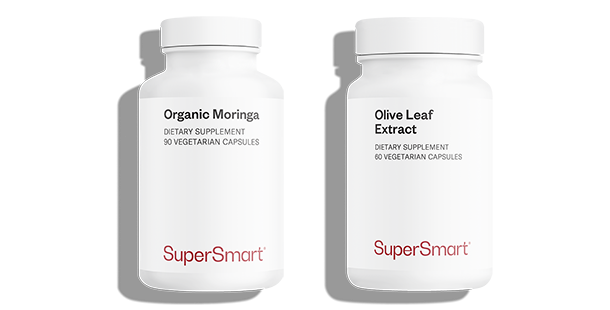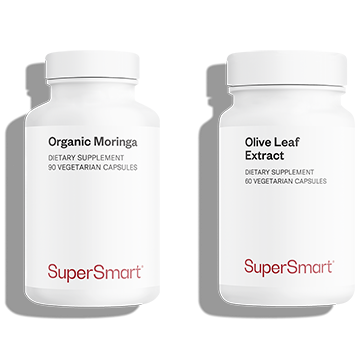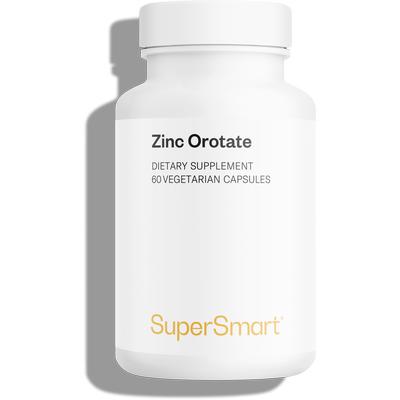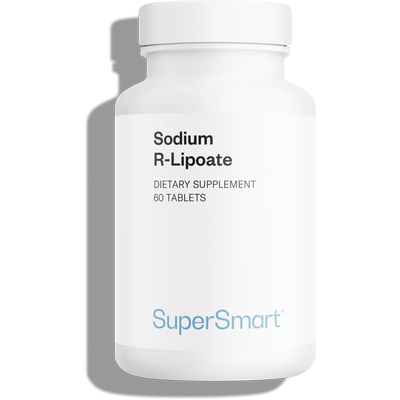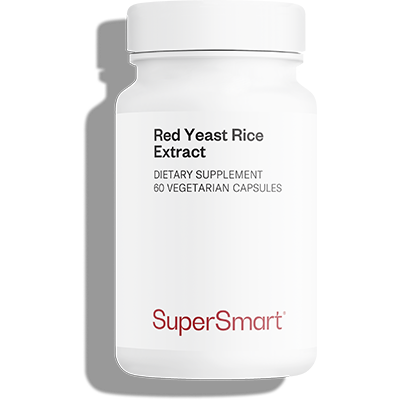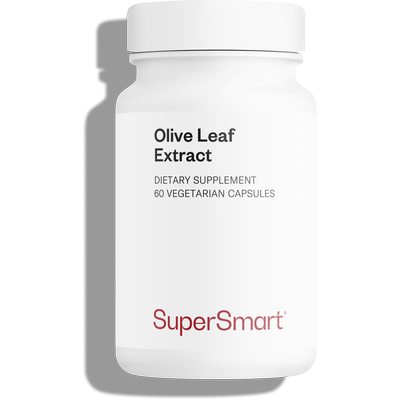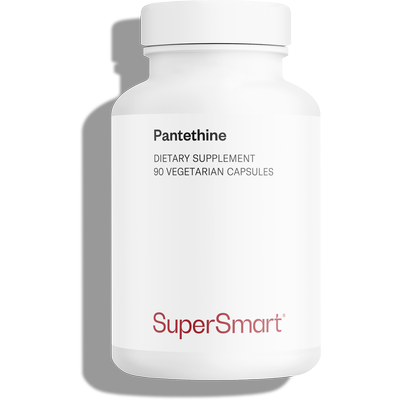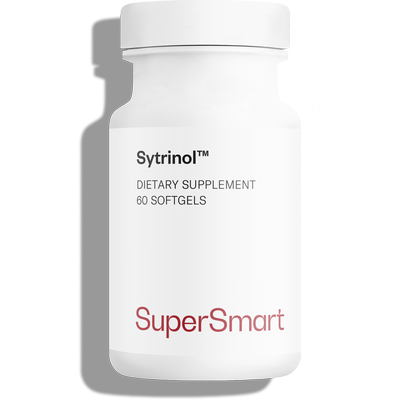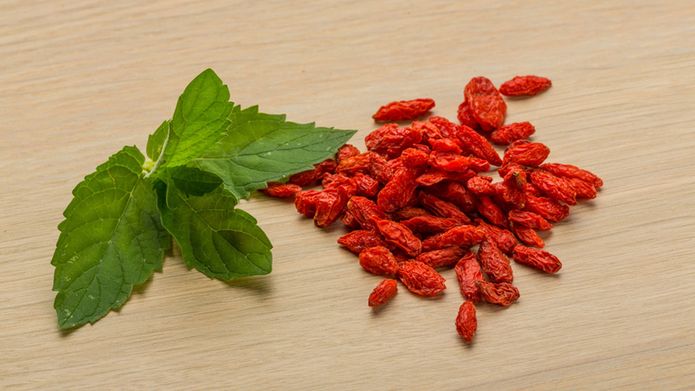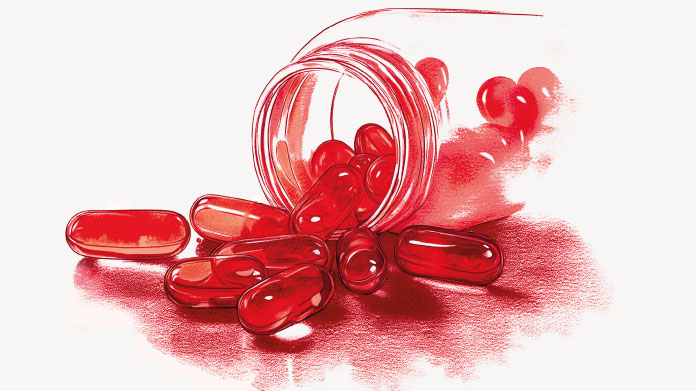In stock
Organic Moringa Leaf Extract + Olive Leaf
Complete your selection
What is in Organic Moringa Leaf Extract + Olive Leaf
Any questions?
Our team of nutrition experts and scientists has the answers.
Olive Leaf Extract a natural-source dietary supplement produced from olive leaves. It contains a very high level of oleuropein, a bioactive phytonutrient specific to the olive tree, which helps control blood lipids and prevent carbohydrate absorption.
It is aimed at anyone who wants to improve their cardiovascular health and maintain the integrity of their blood vessels. Individuals with the following risk factors are likely to be particularly interested in this product:
- Those who are overweight.
- Those with type 2 diabetes.
- Those prone to circulation problems.
- Those with high blood pressure.
- Those who are stressed.
- Those who have hypercholesterolemia.
Organic Moringa leaf extract is an aqueous extract made from the plant’s leaves.
It contains three major types of compound, in addition to the above-mentioned vitamins, minerals and fatty acids:
- Polyphenols, including flavonoids and phenolic acids. The principal flavonoids are quercetin, rutin, chlorogenic acid, kaempferol, myricetin and benzylamine (moringine) (25), while the most abundant phenolic acids are salicylic, gallic, coumarinic and caffeic acid (26) as well as chlorogenic acid. The latter plays a role in glucose metabolism: it is at least partly responsible for the anti-diabetes properties of the extract (27-28).
- Alkaloids, in particular glucosinolates and isothiocyanates, which are primarily responsible for Moringa’s anti-inflammatory effects.
- Saponins, which reduce cholesterol absorption by binding to molecules and acids in bile (29).
In 2007, researchers examined the active principles of Moringa oleifera leaves (30). They found that two additional molecules, niazarin and niaziridin, increase the biological activity of the antibiotic compounds and facilitate gastrointestinal absorption of the vitamins and other micronutrients present in the leaves.
To further enhance the efficacy of Olive Leaf Extract, you can adopt these additional measures throughout the supplementation period:
- Significantly increase your intake of fruit, vegetables, nuts and whole grains.
- Make liberal use of herbs, spices, garlic and onion.
- Only use olive oil for dressings and rapeseed oil for cooking.
- Eat at least one yoghurt a day (preferably sheep’s milk).
- Limit your intake of poultry and red meat, and instead choose fish and seafood whenever possible.
- Be physically active every day (go for a walk after a meal, take part in sports, do some exercises …).
- Take a daily multivitamin supplement.
These measures are part of the Mediterranean diet which is based on the long-term food habits of Mediterranean populations. They are a good accompaniment to supplementing with Olive Leaf Extract though not essential for obtaining the benefits of this product.
This product’s capsules are made of pullulan, a natural polysaccharide obtained by fermenting tapioca or corn. Pullulan contains no animal ingredients and provides an excellent barrier to oxygen, helping to preserve the integrity of the capsule’s ingredients. It is also an eco-friendly alternative to synthetic materials.
Moringa is a plant that has been recognised, used and valued for thousands of years in traditional Ayurvedic medicine. It’s the only genus in the plant family Moringaceae and is grown in the world’s tropical regions and in Madagascar, primarily for the exceptional nutritional value of its leaves (10-11). These contain vitamins (particularly vitamins C, B6 and B2), minerals (primarily iron and magnesium), important amino acids and fatty acids (12-3), as well as precious antioxidants including rare carotenoids, flavonoids and phenols (14).
Several studies have shown that Moringa leaves were used for their anti-inflammatory (17), anti-hypertensive (18), diuretic, antimicrobial (10), antioxidant (20), anti-hyperlipidaemic (21), cardio-protective and liver-protective (22-23) properties. According to Ayurvedic medicine practitioners, Moringa may prevent more than 300 diseases (24)!
The effect of Olive Leaf Extract capsules has been directly measured in three clinical trials (22).
1) One year’s supplementation with 250mg a day
Following 12 months’ daily supplementation by subjects with elevated cholesterol levels, researchers recorded:
- A 20% reduction in ‘bad’ LDL-cholesterol.
- A 13% increase in ‘good’ HDL-cholesterol.
- A 10% decrease in total cholesterol and a 5% decrease in triglycerides.
2) Four weeks’ supplementation with 250mg a day
In overweight subjects, there was a significant improvement over four weeks in the expected ratio of coronary risk as compared with placebo. A clear decrease in triglycerides was observed.
3) Eight weeks’ supplementation with 250mg a day
The third study examined the ability of Olive Leaf Extract to reduce oxidative stress. Results showed that daily supplementation with 250mg reduced levels of MDA (malondialdehyde) by almost a third, a urinary marker of oxidative stress.
Why use extracts of olive leaf rather than olives?
Studies suggest that the leaves and fruit are equally rich in oleuropein (23), but the olive leaf is considered a more renewable natural source for extraction (24). Hence its use in Olive Leaf Extract, and its ingredient Olécol®.
Moringa oleifera is considered to be extremely safe. It features in the composition of a wide variety of medicinal preparations. No serious side-effects have been demonstrated in human studies (31).
The recommended dose is three capsules a day, to be taken with food, for at least five weeks.
You may also be interested in other quality phytonutrients available to buy from our catalogue:
- Apple Polyphenols, a supplement of polyphenols from apples.
- Bioperine, a black pepper extract.
- Broccoli Sulforaphane Glucosinolate 300 mg, a broccoli extract standardised in sulforaphane.
- Butterbur Extract 50 mg, an extract of butterbur.
- Catuaba Power, a catuaba extract.
- Chrysantellum americanum 400 mg, a natural extract of Chrysantellum americanum.
- Natural Iodine 500 mg a natural source of iodine with multiple benefits.
- Olive Leaf Extract, a Mediterranean triple-action formulation against cholesterol.
This product’s capsules are composed of HPMC (hydroxypropyl methylcellulose), a plant substance derived from cellulose. HPMC is widely used for medicines and dietary supplements. It contains no animal ingredients, is recognised as safe by health authorities and is considered more sustainable than synthetic alternatives.
Need help?
You may also like

